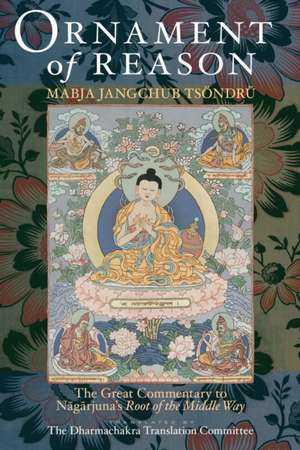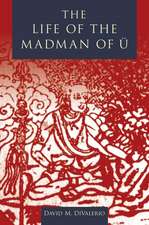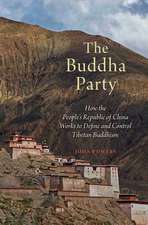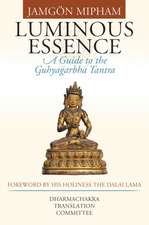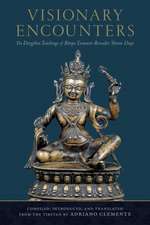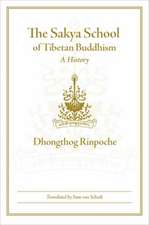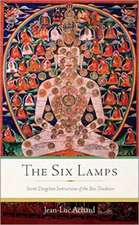Ornament of Reason: The Great Commentary to Nagarjuna's Root of the Middle Way
Autor Mabja Jangchub Tsondru Traducere de Dharmachakra Translation Committeeen Limba Engleză Hardback – 31 mar 2011
Preț: 375.15 lei
Nou
Puncte Express: 563
Preț estimativ în valută:
71.78€ • 78.22$ • 60.49£
71.78€ • 78.22$ • 60.49£
Carte disponibilă
Livrare economică 02-16 aprilie
Preluare comenzi: 021 569.72.76
Specificații
ISBN-13: 9781559393683
ISBN-10: 1559393688
Pagini: 598
Dimensiuni: 160 x 232 x 37 mm
Greutate: 0.94 kg
Editura: Snow Lion Publications
ISBN-10: 1559393688
Pagini: 598
Dimensiuni: 160 x 232 x 37 mm
Greutate: 0.94 kg
Editura: Snow Lion Publications
Notă biografică
Mabja Jangchub Tsöndrü, active in the twelfth century, was among the first Tibetans to rely on the works of the Indian master Candrakirti—and his account of the Middle Way exercised a deep and lasting influence on the development of Madhyamaka philosophy in all four schools of Buddhism in Tibet.
Recenzii
"I am pleased to know that great care has been taken in preparing this translation along with the early Tibetan commentator Mabja Jangchub Tsondru's explanation of the Root of the Middle Way. I have no doubt that readers interested in the development of the Madhyamika view will derive great benefit from this work"—H.H. the Dalai Lama
"Because of its clarity and profundity, Mabja's Ornament of Reason is considered one of the greatest Tibetan commentaries on the Root of the Middle Way, Nagarjuna's most important work. Thomas Doctor's complete translation of the Ornament is truly masterful. Written in straightforward English, free from jargon and neologism, Doctor's work is a model for the translation of a Tibetan philosophical classic. Lucid, accessible, and yet utterly true to the original, it sets the standard for any philosophical translation undertaken in the future. No one who is serious about understanding Madhyamaka can afford to overlook this book."—José Ignacio Cabezón, XIV Dalai Lama Professor, UC Santa Barbara
"Mabja's Ornament of Reason is one of the most important Tibetan commentaries on Nagarjuna's Root of the Middle Way. It is an original work that offers interpretations of Madhyamaka philosophy that cannot be ignored by those who are intent on studying seriously this tradition. Thomas Doctor's masterful translation, which is as accurate as it is readable, makes an extremely valuable contribution by making available the important insights that this work offers—insights that will help the readers to understand Nagarjuna's original text at the same time that it will illuminate important philosophical problems. A must read for all those who think that the Madhyamaka philosophy is an important tradition deserving of sustained philosophical attention."—Georges B.J. Dreyfus, Professor of Religion, Williams College
"Because of its clarity and profundity, Mabja's Ornament of Reason is considered one of the greatest Tibetan commentaries on the Root of the Middle Way, Nagarjuna's most important work. Thomas Doctor's complete translation of the Ornament is truly masterful. Written in straightforward English, free from jargon and neologism, Doctor's work is a model for the translation of a Tibetan philosophical classic. Lucid, accessible, and yet utterly true to the original, it sets the standard for any philosophical translation undertaken in the future. No one who is serious about understanding Madhyamaka can afford to overlook this book."—José Ignacio Cabezón, XIV Dalai Lama Professor, UC Santa Barbara
"Mabja's Ornament of Reason is one of the most important Tibetan commentaries on Nagarjuna's Root of the Middle Way. It is an original work that offers interpretations of Madhyamaka philosophy that cannot be ignored by those who are intent on studying seriously this tradition. Thomas Doctor's masterful translation, which is as accurate as it is readable, makes an extremely valuable contribution by making available the important insights that this work offers—insights that will help the readers to understand Nagarjuna's original text at the same time that it will illuminate important philosophical problems. A must read for all those who think that the Madhyamaka philosophy is an important tradition deserving of sustained philosophical attention."—Georges B.J. Dreyfus, Professor of Religion, Williams College
